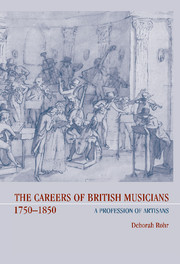Book contents
- Frontmatter
- Contents
- List of tables
- Acknowledgments
- List of abbreviations
- Introduction
- 1 The social and professional status of musicians in the eighteenth century
- 2 Social profile
- 3 Patronage
- 4 Musical education
- 5 Church musicians
- 6 Secular musicians: singers
- 7 Secular musicians: instrumentalists
- 8 Teachers, composers, and entrepreneurs
- 9 The fortunes of musicians
- 10 The struggle for social and professional status
- Epilogue
- Appendix
- Notes
- Bibliography
- Index
Epilogue
Published online by Cambridge University Press: 20 October 2009
- Frontmatter
- Contents
- List of tables
- Acknowledgments
- List of abbreviations
- Introduction
- 1 The social and professional status of musicians in the eighteenth century
- 2 Social profile
- 3 Patronage
- 4 Musical education
- 5 Church musicians
- 6 Secular musicians: singers
- 7 Secular musicians: instrumentalists
- 8 Teachers, composers, and entrepreneurs
- 9 The fortunes of musicians
- 10 The struggle for social and professional status
- Epilogue
- Appendix
- Notes
- Bibliography
- Index
Summary
The second half of the nineteenth century saw real advances, although with increasing fragmentation of the profession. The respectability of careers in church music remained an advantage, although they never achieved the superior status they had once enjoyed relative to the rest of the profession. Foreign musicians continued to travel to Britain, particularly as instrumental and vocal soloists. Many organists and teachers chose to build practices in the provinces or abroad (particularly in America), where they appear to have enjoyed a prestige comparable to that of Continental musicians in Britain.
Although many musicians failed to attain a respectable social or financial status, some of the most virulent prejudices against their characters seem to have abated in the second half of the century. Reginald Nettel attributed this in part to the influence of Mendelssohn, who was idolized by the musical public for his personality as much as for his music. Nettel also argued that the musical patronage exerted by the Prince Consort influenced “public opinion towards a more favourable acceptance of musicians in society”. A contemporary observer, Francis Hueffer, noted some status gains and similarly attributed them to royal influence. He reported in 1889 that the worst kinds of prejudice and ignorance about music had become less widespread than in earlier years:
This stolid obtuseness, formerly so common, can no longer be laid to the charge of intelligent Englishmen; and that this is so, and that musicians are no longer separated from the rest of society by the barriers which of old at fashionable parties took the tangible shape of a cord dividing the professionals from the rest of the company, is in no small measure due to the enlightened encouragement of art and artists by the reigning sovereign.
- Type
- Chapter
- Information
- The Careers of British Musicians, 1750–1850A Profession of Artisans, pp. 181 - 184Publisher: Cambridge University PressPrint publication year: 2001



